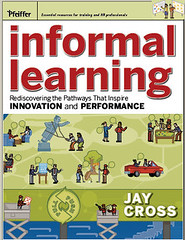Internet Time Commons

This site is for us. You and me and anyone who cares to join us. It's a place to watch or join a debate. You can grab some advice here -- or give some. This is a gift economy site. It's free because it is a network.
Networks of ideas are perpetual-motion machines. Every new member receives more value than person just ahead of him. The more people and ideas, the more valuable the network. Everybody wins. Our goal is to make the pie bigger, not to take your piece. The benefits of participation can grow exponentially. This cycle of increaingly good will can create a great resource for us.
 Access to tools. Like the Whole Earth Catalog of the 70s and 80s, we aspire to provide access to tools, mainly mind tools. Issues and content
Access to tools. Like the Whole Earth Catalog of the 70s and 80s, we aspire to provide access to tools, mainly mind tools. Issues and content
Principles: Transparency. Progress. Collaboration. Fun. Networking.
The Rules here are few.
Civility.
Identify yourself when you post.
You must register to post.
Transparentcy valued. Candor Honesty.
Full disclosure of commercial interests.
In case of disputes, I am judge and jury.

Focus
I am passionate about the convergence of learning, business, and networks. I'm planting their seeds here to nurture my thinking about them. In time, public parks will replace cow pastures. We've got plenty of space to explore other topics.

February 6-13-20-27. Entirely online. Become confident in marrying web technology to corporate learning. More...
We are exploring the intersection of unconferences and learning with Social Media Club.
 Writing on the Walls Retreat
Writing on the Walls Retreat
This is the transformational business skill described in Informal Learning. You’ll come away with the ability to make drawings that inspire groups and clarify new gameplans. My attendance proves that you need no artistic skills to do this. Next session is January 19-20 in Bodega Bay, about an hour up the coast from San Francisco.

Check out Xplane's new site. Look at the projects page; it's a lesson on process graphics in itself. 

Informal Learning
is now available at Amazon.

Coming soon: Informal Learning, the Missing Chapters
Pre 2003 KnowledgeBase
Articles
Blogs
Community
Design
eLearning
FirstPrinciples
Glossary
HowPeople Learn
Implementation
InformalLearning
KnowledgeManagement
Links
Meta-Learning
Metrics
OurNewsletters
PopularItems
Presentations
Psychology
Restaurants
SiteMap
SocialSoftware
StringTheory
Time
VisualLearning
OnWriting
WorkflowInstitute
Graphics
Beta forever
Community doc
wiki share
Vital docs
The Underground History of American Education by John Taylor Gatto
An engaging and persuasive indictment of American schools. "The shocking possibility that dumb people don’t exist in sufficient numbers to warrant the millions of careers devoted to tending them will seem incredible to you. Yet that is my central proposition: the mass dumbness which justifies official schooling first had to be dreamed of; it isn’t real."
When award-winning teacher Gatto dropped out, he wrote this editorial that appeared in the Wall Street Journal:
Government schooling is the most radical adventure in history. It kills the family by monopolizing the best times of childhood and by teaching disrespect for home and parents. The whole blueprint of school procedure is Egyptian, not Greek or Roman. It grows from the theological idea that human value is a scarce thing, represented symbolically by the narrow peak of a pyramid.
That idea passed into American history through the Puritans. It found its "scientific" presentation in the bell curve, along which talent supposedly apportions itself by some Iron Law of Biology. It’s a religious notion, School is its church. I offer rituals to keep heresy at bay. I provide documentation to justify the heavenly pyramid.
Socrates foresaw if teaching became a formal profession, something like this would happen. Professional interest is served by making what is easy to do seem hard; by subordinating the laity to the priesthood. School is too vital a jobs-project, contract giver and protector of the social order to allow itself to be "re-formed." It has political allies to guard its marches, that’s why reforms come and go without changing much. Even reformers can’t imagine school much different.
David learns to read at age four; Rachel, at age nine: In normal development, when both are 13, you can’t tell which one learned first—the five-year spread means nothing at all. But in school I label Rachel "learning disabled" and slow David down a bit, too. For a paycheck, I adjust David to depend on me to tell him when to go and stop. He won’t outgrow that dependency. I identify Rachel as discount merchandise, "special education" fodder. She’ll be locked in her place forever.
In 30 years of teaching kids rich and poor I almost never met a learning disabled child; hardly ever met a gifted and talented one either. Like all school categories, these are sacred myths, created by human imagination. They derive from questionable values we never examine because they preserve the temple of schooling.
That’s the secret behind short-answer tests, bells, uniform time blocks, age grading, standardization, and all the rest of the school religion punishing our nation. There isn’t a right way to become educated; there are as many ways as fingerprints. We don’t need state-certified teachers to make education happen—that probably guarantees it won’t.
How much more evidence is necessary? Good schools don’t need more money or a longer year; they need real free-market choices, variety that speaks to every need and runs risks. We don’t need a national curriculum or national testing either. Both initiatives arise from ignorance of how people learn or deliberate indifference to it. I can’t teach this way any longer. If you hear of a job where I don’t have to hurt kids to make a living, let me know. Come fall I’ll be looking for work.
href="http://creativecommons.org/licenses/by-sa/2.5/">
This work is licensed under a Creative Commons Attribution-Share Alike 2.5 License.
Comments (0)
You don't have permission to comment on this page.